BMW X7 vs Hyundai Kona – Differences & prices compared
Compare performance, boot space, consumption and price in one view.
Find out now: which car is the better choice for you – BMW X7 or Hyundai Kona?
The BMW X7 (SUV) comes with a Diesel MHEV, Petrol MHEV or Petrol engine and Automatic transmission. In comparison, the Hyundai Kona (SUV) features a Petrol, Full Hybrid or Electric engine with Manuel or Automatic transmission.
When it comes to boot capacity, the BMW X7 offers 750 L, while the Hyundai Kona provides 466 L – depending on how much space you need. If you’re looking for more power, decide whether the 530 HP of the BMW X7 or the 218 HP of the Hyundai Kona suits your needs better.
In terms of consumption, the values are 8 L per 100 km for the BMW X7, and 14.60 kWh4.50 L for the Hyundai Kona.
Price-wise, the BMW X7 starts at 90500 £, while the Hyundai Kona is available from 23100 £. Compare all the details and find out which model fits your lifestyle best!
BMW X7
The BMW X7 stands as a remarkable testament to luxury and performance within the SUV market. Its design seamlessly blends elegance with a robust presence, ensuring a commanding stance on the road. Inside, it offers a lavish interior adorned with premium materials and cutting-edge technology to enhance the driving experience.
details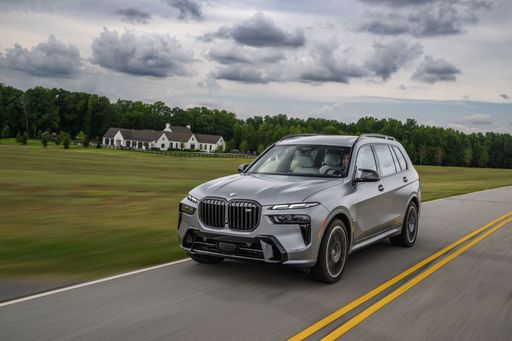 @ press.bmwgroup.com
@ press.bmwgroup.com
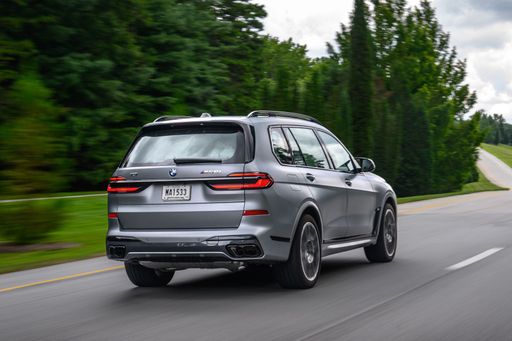 @ press.bmwgroup.com
@ press.bmwgroup.com
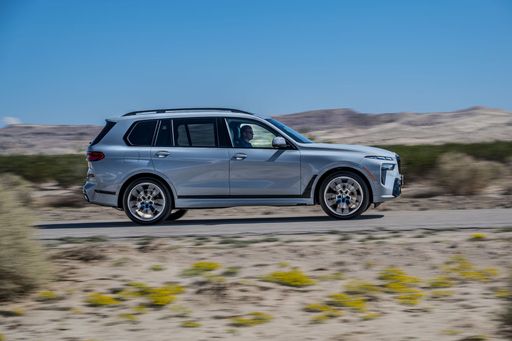 @ press.bmwgroup.com
@ press.bmwgroup.com
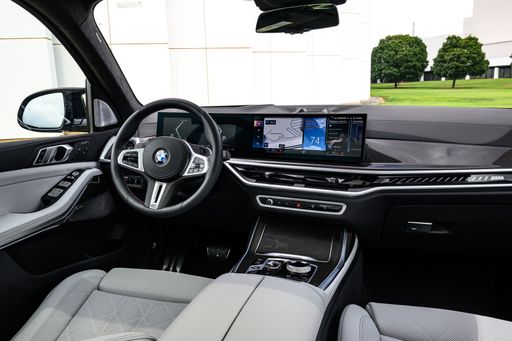 @ press.bmwgroup.com
@ press.bmwgroup.com
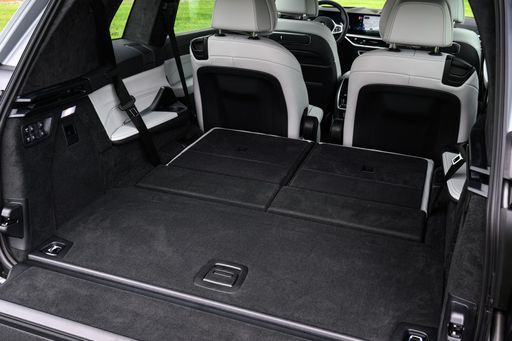 @ press.bmwgroup.com
@ press.bmwgroup.com
Hyundai Kona
The Hyundai Kona blends a bold design with a versatile interior, making it a standout choice in the compact SUV market. Its crisp handling and responsive steering provide an engaging driving experience, whether in the city or on the open road. The vehicle also offers a range of features designed to enhance comfort and connectivity, ensuring a pleasurable journey for both driver and passengers.
details @ hyundai.news
@ hyundai.news
 @ hyundai.news
@ hyundai.news
 @ hyundai.news
@ hyundai.news
 @ hyundai.news
@ hyundai.news

|

|
|
|
|
Costs and Consumption |
|
|---|---|
|
Price
90500 - 117500 £
|
Price
23100 - 41600 £
|
|
Consumption L/100km
8 - 12.1 L
|
Consumption L/100km
4.5 - 6.9 L
|
|
Consumption kWh/100km
-
|
Consumption kWh/100km
14.6 - 16.8 kWh
|
|
Electric Range
-
|
Electric Range
377 - 514 km
|
|
Battery Capacity
-
|
Battery Capacity
1.3 - 65.4 kWh
|
|
co2
210 - 274 g/km
|
co2
0 - 157 g/km
|
|
Fuel tank capacity
80 - 83 L
|
Fuel tank capacity
38 - 47 L
|
Dimensions and Body |
|
|---|---|
|
Body Type
SUV
|
Body Type
SUV
|
|
Seats
7
|
Seats
5
|
|
Doors
5
|
Doors
5
|
|
Curb weight
2490 - 2675 kg
|
Curb weight
1370 - 1773 kg
|
|
Trunk capacity
750 L
|
Trunk capacity
466 L
|
|
Length
5181 mm
|
Length
4350 - 4385 mm
|
|
Width
2000 mm
|
Width
1825 mm
|
|
Height
1835 mm
|
Height
1580 - 1585 mm
|
|
Payload
680 - 760 kg
|
Payload
420 - 490 kg
|
Engine and Performance |
|
|---|---|
|
Engine Type
Diesel MHEV, Petrol MHEV, Petrol
|
Engine Type
Petrol, Full Hybrid, Electric
|
|
Transmission
Automatic
|
Transmission
Manuel, Automatic
|
|
Transmission Detail
Automatic Gearbox
|
Transmission Detail
Manual Gearbox, Dual-Clutch Automatic
|
|
Drive Type
All-Wheel Drive
|
Drive Type
Front-Wheel Drive, All-Wheel Drive
|
|
Power HP
352 - 530 HP
|
Power HP
100 - 218 HP
|
|
Acceleration 0-100km/h
4.7 - 5.9 s
|
Acceleration 0-100km/h
7.8 - 13.3 s
|
|
Max Speed
245 - 250 km/h
|
Max Speed
162 - 208 km/h
|
|
Torque
520 - 750 Nm
|
Torque
200 - 265 Nm
|
|
Number of Cylinders
6 - 8
|
Number of Cylinders
3 - 4
|
|
Power kW
259 - 390 kW
|
Power kW
74 - 160 kW
|
|
Engine capacity
2993 - 4395 cm3
|
Engine capacity
998 - 1598 cm3
|
General |
|
|---|---|
|
Model Year
2023
|
Model Year
2024
|
|
CO2 Efficiency Class
G
|
CO2 Efficiency Class
D, C, E, F, A
|
|
Brand
BMW
|
Brand
Hyundai
|
BMW X7
Introduction to the BMW X7: A Luxurious Powerhouse
The BMW X7 stands as a testament to BMW's dedication to luxury, performance, and state-of-the-art technology. As BMW's flagship SUV, the X7 effortlessly combines opulent features with innovative engineering, ensuring a driving experience that is both exhilarating and refined.
Engine and Performance: A Blend of Power and Efficiency
Under the bonnet, the BMW X7 offers a variety of powertrains to suit different driving preferences. From the robust diesel mild-hybrid to the powerful petrol engine options, each boasts BMW's hallmark of efficiency without compromising on performance. With horsepower ranging from 352 to a staggering 530 PS, and acceleration from 0-100 km/h in just 4.7 seconds, the X7 delivers a thrilling yet smooth ride.
The advanced all-wheel-drive system ensures confidence-inspiring handling, while the state-of-the-art automatic transmission provides seamless gear changes, enhancing both city and highway driving experiences.
Design and Dimensions: Majestic and Commanding
The X7 makes a commanding statement with its expansive dimensions. Measuring 5181 mm in length and 2000 mm in width, BMW has designed this SUV not only to impress but also to offer unparalleled space within. The interior accommodates seven seats, providing generous comfort for every passenger. Coupled with a striking exterior design, the X7 is a blend of elegance and strength.
Technological Innovations: Ahead of Its Time
BMW's commitment to innovation is evident in every aspect of the X7. The SUV is equipped with cutting-edge features such as the M Sportpaket Pro Steptronic Sport, ensuring an engaging driving experience. The integration of state-of-the-art safety and driver-assistance systems further enhances on-road safety, making each journey as secure as it is enjoyable.
Inside, the high-quality infotainment system ensures passengers are connected and entertained, thanks to the intuitive control interfaces and connectivity options. Whether navigating city streets or cruising long distances, the X7's technology facilitates a seamless experience.
Environmental Considerations and Efficiency
Despite its powerful performance, the BMW X7 remains conscious of its environmental impact. Equipped with mild-hybrid technology, it achieves a balanced fuel consumption, with efficiency ratings between 7.9 and 12.1 L/100km. This demonstrates BMW's commitment to reducing emissions while providing a dynamic driving experience.
Conclusion: A Testament to Excellence
In conclusion, the BMW X7 is more than just an SUV; it is a symbol of luxury, performance, and technological advancement. Whether for the daily commute or cross-country adventures, the X7 stands prepared to exceed expectations, offering a driving experience marked by elegance and engineering prowess. For those seeking a vehicle that encapsulates the best of BMW, the X7 is an aspirational choice that delivers on all fronts.
Hyundai Kona
The Hyundai Kona: A Comprehensive Overview
The Hyundai Kona has established itself as a standout in the compact SUV segment, blending innovation with performance and style. As the automotive world moves towards more sustainable and efficient options, the Kona offers a variety of powertrains, from traditional petrol engines to full hybrids and all-electric models.
Powertrain Options and Performance
The Hyundai Kona's powertrain choices cater to a wide range of preferences. For petrol enthusiasts, the Kona offers a 1.0L T-GDI engine, delivering 100 PS, and a more robust 1.6L T-GDI variant with up to 170 PS. Those looking for efficiency without sacrificing power can consider the full hybrid model, offering 129 PS and an impressive consumption of 4.5 L/100km.
For a greener option, the all-electric Kona provides a compelling case. With battery capacities of up to 65.4 kWh, the electric Kona offers power outputs of 156 to 218 PS, and efficiencies as low as 14.6 kWh/100km, enabling an electric range of up to 513 km.
Technical Specifications and Innovations
Built on a robust platform, the Kona delivers versatility and reliability. With a choice between manual or dual-clutch automatic gearboxes, along with options for front-wheel or all-wheel drive, the Kona ensures a tailored driving experience. The handling is enhanced by the car's lightweight construction, balancing a 1370 to 1773 kg curb weight with dynamic performance.
The Kona's design doesn't compromise cargo space for style; it offers a generous 466 L boot capacity. With a relatively compact body, measuring 4350 to 4385 mm in length, the Kona easily navigates urban environments while still commanding a strong road presence with its 1825 mm width.
Efficiency and Eco-Friendliness
Hyundai is committed to reducing emissions, as evidenced by the Kona's CO2 efficiency ratings, which range from class A for electric models to class D for some higher-performance petrol variants. The focus on reducing environmental impact without sacrificing driving pleasure is notable throughout the Kona range.
Costing and Value
The Hyundai Kona offers commendable value for money. Pricing starts at €26,400 and reaches up to €50,690, depending on the chosen configuration. The monthly running costs range from €956 to €1090, with a cost per kilometre of 38.3 to 43.6 cents, making it a competitive option in its class.
Conclusion: Modern, Efficient, and Versatile
The Hyundai Kona stands as a testament to Hyundai's commitment to innovation, efficiency, and practicality. Whether you are inclined towards a traditional combustion engine, a hybrid for a balance of power and efficiency, or a full electric model for maximum eco-friendliness, the Kona provides a tailored solution for each unique driver preference.
Which drive types are available for the BMW X7?
Available as All-Wheel Drive.
The prices and data displayed are estimates based on German list prices and may vary by country. This information is not legally binding.
